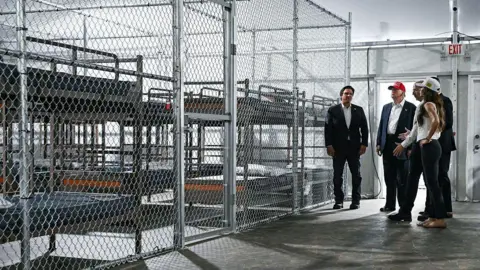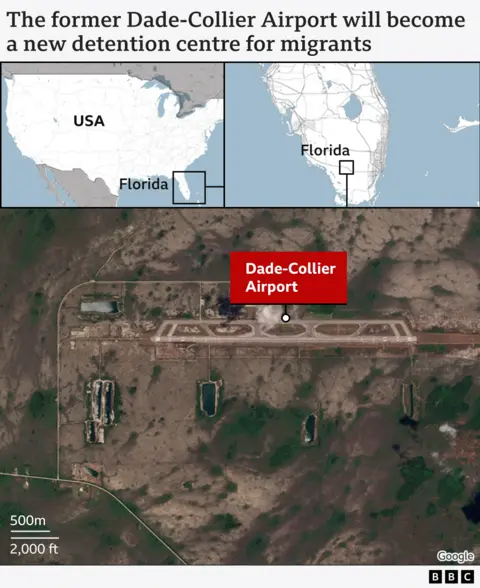Trump visits 'Alligator Alcatraz', the next step in his immigration crackdown
US President Donald Trump has visited the new Florida detention centre dubbed "Alligator Alcatraz", where around 3,000 migrants are expected to be held, surveying the next step in his crackdown on illegal immigration.
While touring the facility in the Florida Everglades, Trump said it will soon house the most "menacing migrants, some of the most vicious people on the planet".
The administration said alligators, crocodiles and pythons in the surrounding wetlands would keep detainees from escaping the centre.
Some state lawmakers, the local mayor, environmental groups and neighbours oppose its construction, saying that it could hurt an important ecosystem.
 Getty Images
Getty Images"We're surrounded by miles of treacherous swampland and the only way out is, really, deportation," Trump said on the tour, adding that he "wouldn't want to run through the Everglades for long" and that anyone who attempted to do so would be met by "a lot of cops in the form of alligators".
The facility is designed to hold 3,000 detainees, with the first expected to arrive as soon as Wednesday. A second facility - meant to house 2,000 people - is going to be built near Jacksonville.
During his visit - which experienced both bitter heat and humidity and torrential rain in the space of a few hours - Trump toured a medical facility in the complex, as well as a large air conditioned tent that will house detainees, with several cage-like compartments enclosed by chain-link fence.
Speaking to reporters, Florida Governor Ron DeSantis said that he intends to deputise members of the state's National Guard Judge Advocate Corps, or Jags, to act as immigration judges and facilitate rapid removals from the country.
The president said the facility "could be" a model for future such facilities, adding that his administration is actively working with the governments of several Republican-run states, such as Louisiana, to find other suitable locations.
"They can have their hearings, to get due process and then immediately be flown back home to their home countries," said Homeland Security Secretary Kristi Noem, who accompanied Trump on the trip.
Trump said he already approved of the governor's plan.
Both Trump and Noem repeatedly said that they believed the facility would encourage undocumented migrants to self-deport.
Noem claimed one million have already done so, but admitted the government is unsure of the true figure, as some did so without using the official Customs and Border Protection app and because their countries of origin have not yet provided data.
It will cost about $450m (£332m) a year to run and funding will mostly come from a temporary shelter and services programme that the Federal Emergency Management Agency had used for undocumented immigrants, according to Noem.

Local residents who live near the site, like Betty Osceola, a member of the Miccosukee Native American community, have told the BBC they are worried that the temporary facility will become permanent.
"I have serious concerns about the environmental damage," she said, as she stood next to a canal where an alligator was swimming.
Experts warn the damage to area wetlands and endangered species could undo the state's massive effort to restore the Everglades, which has cost Florida billions of dollars. It is home to endangered species such as the Florida panther and the West Indian manatee.
Elise Pautler Bennett, an attorney at the Center for Biological Diversity, described the Everglades as "the most sensitive place in Florida", making development of a detention centre there "risky".
"Any other project that would have been proposed in the Everglades would have gone through an intense environmental approval process, I'm convinced this one didn't get that because it's a political stunt," Ms Bennett told the BBC.
The move to build a new centre comes as human rights organisations warn detentions centres are becoming overcrowded.
Immigration and Customs Enforcement (ICE) currently has a record 59,000 detainees in custody nationwide, 140% above its capacity, according to data obtained by CBS, the BBC's news partner.
Like the former prison Alcatraz in the middle of the San Francisco Bay, which Trump has said he wants to reopen, the facility will be hard to reach.
It will be situated on the Dade-Collier Training and Transition Airport, a public airport around 58km (36 miles) from Miami, and an area deemed an ecologically important subtropical wetland.
Cecilia Barría and Walter Fojo contributed reporting
